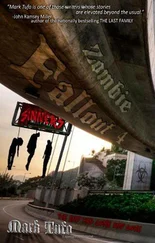Our media buyers, like Jane Trimble and Tory Friedman, tended to be small, chipper, well-dressed women who wore strong perfume and had an easy knack for conversation. They kept bags of sweets in their desk drawers and never gained any weight. They spent most of their time on the phone talking with vendors, the deadening prospect of which made us gag, and for their services, they received random gifts and tickets to sporting events, the blatant unfairness of which angered us with a blind and murderous envy. Because they put the orders in and talked with friendly inflections in their voices, they were bribed with largesse, like dirty checkpoint guards, and we thought they deserved a special ring of hell, the ring devoted to corrupt mayors, lobbyists, and media buyers. That was how we felt, anyway, during our time in the system. When one of us walked Spanish and got out of the system, we thought back on those loquacious and smiling media buyers as just some of the nicest people.
Tom’s gripe was with Jane. “He’s got to take that goddamn billboard down,” he said to her after walking into her office without a knock or a greeting. Unfortunately Jane knew just what he was referring to: the vendor with whom she had placed the order. Flyers of the missing girl were not the only effort we had made to help Janine and Frank Gorjanc during the days of their short-lived search for their daughter. Using some of their money, supplemented by hastily raised funds, we had the same image of Jessica from the fourth grade with the word MISSING and a number to call placed on a billboard on I-88 facing westbound traffic. Long after the girl had been found, that billboard was still up there. Jane tried to explain that nobody wanted to see that billboard come down as much as she did, but that these things took time when there was no immediate turnover. “No immediate turnover?” cried Tom. “It’s been six months!” “He promises me he’s working on it,” Jane replied with the courtesy and patience expected of media buyers. “Well that’s not good enough,” Tom barked at her. “At least have him strip it.” “Stripping,” explained Jane sheepishly, knowing how crass she must have sounded, “unfortunately costs money, Tom.”
It was an unpopular space, that was the problem. Far out on I-88, west of the Fox River, metropolitan Chicago effectively came to an end, yielding its industrial parks and suburban tract housing to fields of alfalfa and small towns with single gas stations. Billboards in North Aurora were good for casino boat and cigarette ads, and maybe the occasional AIDS awareness campaign, but little else. The vendor might have taken a hit on the rental fee but to rent it at all was likely a great boon to him, and he probably never had a client complain about continued exposure after the lease expired. Free advertising — who could complain about that?
If there was an opportunity to complain, we complained. The creative team complained about the account team. The account team complained about the client. Everybody complained at one time or another about human resources, and human resources complained among themselves about each and every one of us. About the only people not complaining were the media buyers, because they were showered with bribes of tickets and gifts, but when Janine complained to Tom about the billboard, Tom Mota took that complaint to them. The billboard, he said, advertised Jessica as missing, when Jessica had not been missing for months. Jessica had been found. Jessica had been buried. He complained that Janine had to see that billboard on the side of I-88 every day on her way home from work, had to be reminded of the week she spent waiting in numb and desperate hope that that billboard might help in some way to bring her little girl back, and of her devastation when she learned that it would not. Now that billboard was nothing but a vicious reminder, broadcasting from a great height the girl’s cruel fate. Tom wouldn’t stand for it. He complained about the son-of-a-bitch vendor who moved unconscionably slowly, and about the bright, uncomplaining dispositions of media buyers like Jane Trimble — complained so much that Jane had to get on the phone with the vendor and complain. When she got off the phone with the vendor, Jane called Lynn Mason to complain about Tom Mota — just one more complaint that must have contributed to his eventual termination.
On the morning in May Lynn Mason was scheduled to be in surgery, the day after she let go of Chris Yop, Yop was back in the building, standing at a print station. Marcia Dwyer was startled to find him there. It was early morning. Marcia had come to photocopy the inspiring tale of a cancer survivor featured in an outdated issue of People magazine. When Yop turned and saw her, he gave a start like a cornered animal. “Christ Almighty,” he said. “I thought you were Lynn.”
“Lynn’s in surgery today,” she said, “remember?”
Marcia spoke with a hardcore South Side accent and wore the accompanying tall hair with bangs. Her black curls in back were held in place by some miraculous fixative. If we knew her at all, as she spoke with Yop she probably had one hand on her hip with her wrist turned inward.
“What are you doing back here, Chris?” she asked.
“Working on my resume,” Yop said defensively.
Marcia told us about this encounter a half hour later, when the day officially began. We had congregated by the couches for a double meeting. The day after a meeting with Lynn we usually had a postmeeting meeting conducted by Joe, where the finer points of the project were hammered out without wasting any more of Lynn’s time. Of late, Lynn spent her days in meetings with her fellow partners in an effort to keep us solvent. Not wasting her time had become an imperative.
It was just like us to have two meetings for one project. No one ever wondered if the existence of double meetings might have some bearing on Lynn’s need to have solvency meetings — or if they did, they kept their mouths shut. After all, we liked double meetings. Only in a double meeting could you ask the questions you were reluctant to ask in the first meeting for fear of looking stupid in front of Lynn. We wanted to die looking stupid in front of Lynn, but we didn’t mind it in front of Joe.
One agency we knew about, out in San Francisco, had architects come in to design a floor plan that included live trees, dartboards, flagstones, sun panels, coffee kiosks, and a half-court big enough for a game of three-on-three. Those lucky bastards knew no such thing as a conference room or a frosted-glass door. We had to suffer such insults, but in recompense, we were given mismatching recreational furniture intended to inspire the creative impulse and upon which we were encouraged to lounge. Located in open spaces where the windows lengthened and allowed sunlight to pour in, these little hot spots were a nice break from corridors and cubicles, and where we always went to double meet. Marcia was perched on the edge of one of the recliners, and her hair was particularly tall and sculptural that morning.
She told us Yop seemed offended when she asked him what he was doing at the print station. “It was like he expected me to be a major bitch about it and start hollering for security,” she said, “but I was just asking what he was doing. I mean, just yesterday the guy was laid off, right — and this morning he’s back in the building? What’s that about?”
We couldn’t believe Yop was back in the building.
“I asked him, I says, ‘You shouldn’t be here, right?’ And he says to me, ‘No, I shouldn’t be here.’ So I says, ‘So what happens if somebody catches you?’ and he says, ‘Well, then I’m fucked.’ ‘What’s that mean, you’re fucked?’ I says, and he says, ‘Trespassing!’”
Читать дальше












